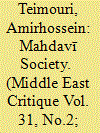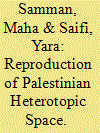|
|
|
Sort Order |
|
|
|
Items / Page
|
|
|
|
|
|
|
| Srl | Item |
| 1 |
ID:
186979


|
|
|
|
|
| Summary/Abstract |
Using the model of promotion and tenure regulations prevalent in Palestine as an impetus, this article argues that these regulations perpetuate neo-coloniality by localizing and reproducing hegemonic center–periphery relations in academia. This is especially true when it comes to using scientometric criteria in the evaluation of knowledge produced by Arab academics and which gives preference to English language over Arabic language publications, to journals over monographs, and when adopting Western assumptions about the form and substance of academic knowledge production. Consequently, Arab universities expand the reach of Western dominance and its control techniques.
|
|
|
|
|
|
|
|
|
|
|
|
|
|
|
|
| 2 |
ID:
186982


|
|
|
|
|
| Summary/Abstract |
This article explores the role Arab music has played in forming Mizrahi identity in contemporary Israeli cinema, focusing on the films “The Ballad of the Weeping Spring”, “Testimony” and “Three Mothers”, which second and third generation Mizrahi filmmakers born to Jewish immigrants from Arab and Muslim countries made in Israel. Using Arab music, these films display the vast array of historical and imaginary relations between the Jew and the Arab, West and East, Israel and the Middle East. Memory of the Arab-Jewish past is a place that cannot be revisited, even if one can travel to the geographical territory that appears to be a place of ‘origin.’ As members of the second and third generations born in Israel, these Mizrahi filmmakers cannot reclaim the Arab-Jewish past of which they never really were a part, and so they try to trace musical routes that will take them to places, histories and encounters with people they have not known before. The grounded certainty of their Mizrahi roots is replaced in the films by the contingencies of the routes that the music enabled.
|
|
|
|
|
|
|
|
|
|
|
|
|
|
|
|
| 3 |
ID:
186981


|
|
|
|
|
| Summary/Abstract |
This article revisits the origins of Kurdish nationalism in Iraq, problematizing the narrative, shared by nationalists and scholars alike, that presents the 1961–1975 insurgency solely as a moment of national awakening. Placing the Kurdish revolt within the social and political conflicts of postcolonial Iraq reveals its strong connection to the Iraqi Revolution of 1958. The early stages of the 1961 revolt must be understood as a reaction of the Kurdish landed class against the post-revolutionary land reform policy and the empowerment of the peasantry. The Kurdish tribal and landowning elite successfully turned its revolt into a national revolution by forcing progressive urban nationalists into a position of subordination and demobilizing the peasantry, formerly the backbone of the anticolonial movement. The hegemonic position of the landed class, won in 1961, had long-term consequences on the development of Kurdish nationalism in Iraq determining its conservative character and the persistent marginalization and depoliticization of the subaltern classes.
|
|
|
|
|
|
|
|
|
|
|
|
|
|
|
|
| 4 |
ID:
186980


|
|
|
|
|
| Summary/Abstract |
This study asks questions about the understudied cultural, especially discursive, consequences of social movements at large, and rightist movements in particular. Focusing on the discursive repertoire of the Islamist rightist movement in Iran (known as principlism), I demonstrate that in response to the liberal Reform Movement (1997–2005), the principlist groups in Iran weaponized a millennial language against liberal reformists beginning in the early 2000s. The institutionalization of the Islamist principlist movement in 2005 mainstreamed this politicized language, giving rise to a new cultural reform politics in the country known under Aḥmadīnizhād as the Mahdavī discourse (millennialism). That is, the Mahdavī discourse represented a new cultural reconfiguration, or “cultural engineering,” in state politics. However, the Green Movement of 2009 as well as the Arab uprisings divided the unified Mahdavī discourse within the principlist movement into divergent millennial discourses. Drawing on millennial-oriented news stories and events from the early 2000s until the rise of the self-identified Islamic State in Syria and Iraq, I highlight the millennial discourses, as well as the Islamist-centered cultural engineering project, as the discursive outcomes of social movements.
|
|
|
|
|
|
|
|
|
|
|
|
|
|
|
|
| 5 |
ID:
186983


|
|
|
|
|
| Summary/Abstract |
This article was written during the first wave of the COVID-19 pandemic in East Jerusalem between March and June 2020. It discusses how the Palestinians approached the pandemic within the context of occupation, and how they used their power to reproduce what Henri Lefebvre called heterotopic spaces. People articulated these spaces accumulatively as they sought meaning in their daily lives, while managing the pandemic and benefitting from their previous experiences during their struggle against Israeli occupation. Thus, the aim is to shed light on the evolving role of civil society to support local action in dealing with a pandemic and to understand COVID-19 from peoples’ perspective rather than from a top-bottom lens in occupied cities. The methodology is multilayered: We use theoretical concepts of heterotopic spaces and analyze them through the social/societal, the temporal/historical, and the spatial/geographical forms of knowledge borrowed from Michel Foucault, Henri Lefebvre, and Edward Soja. It also builds on participant observation, official and media sources, and semi-structured interviews conducted with heads of committees of the Jerusalem Cluster community initiative. Accordingly, the study illustrates how the voices of the people become more significant in taking a leading role in a pandemic crisis in an occupied city.
|
|
|
|
|
|
|
|
|
|
|
|
|
|
|
|
|
|
|
|
|